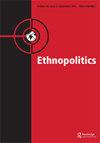Experience of Discrimination and Democratic Engagement
IF 1.2
Q3 ETHNIC STUDIES
引用次数: 1
Abstract
ABSTRACT What effect does discrimination have on democratic engagement? Based on a survey of 3,099 people in Chile, 1,493 of whom identified themselves as ‘Mapuche’—the main ethnic group in the country—the author distinguishes between everyday discrimination (ED), and experiences of discrimination in formal or institutional contexts (FD). The author concludes, first, that ED—more so than FD—has a negative impact on both Mapuche’ and non-Mapuche’ trust in institutions, but that this effect is more pronounced in Mapuche, especially in the case of law enforcement institutions. Second, that increases in ED are associated with higher levels of political identification—especially in the Mapuche group—but that increases in FD have the reverse effect. Third, that increases in ED—more so than increases in FD—are associated with a greater justification of the use of force as a mechanism for resolving conflicts, especially in the Mapuche group. These findings concur only partially with theories on discrimination and political behaviour applied to European countries and the United States.歧视与民主参与的经验
歧视对民主参与有什么影响?根据对智利3099人的调查,其中1493人认为自己是“马普切人”(该国的主要民族),作者区分了日常歧视(ED)和正式或制度背景下的歧视经历(FD)。作者的结论是,首先,ed比fd对马普切人和非马普切人对机构的信任都有负面影响,但这种影响在马普切人中更为明显,尤其是在执法机构的情况下。第二,ED的增加与更高水平的政治认同有关——尤其是在马普切人群体中——但FD的增加会产生相反的效果。第三,ed的增加比fd的增加更有理由使用武力作为解决冲突的机制,特别是在马普切群体中。这些发现与适用于欧洲国家和美国的关于歧视和政治行为的理论只有部分一致。
本文章由计算机程序翻译,如有差异,请以英文原文为准。
求助全文
约1分钟内获得全文
求助全文

 求助内容:
求助内容: 应助结果提醒方式:
应助结果提醒方式:


